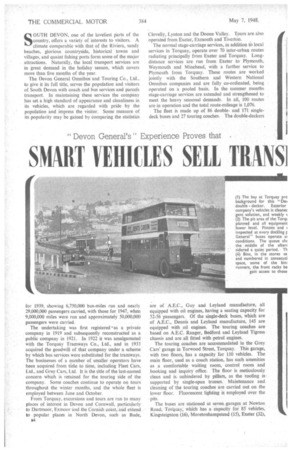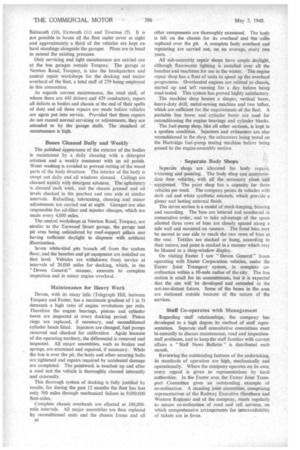SMART VEHICLES SELL TRA\S1
Page 38

Page 40

If you've noticed an error in this article please click here to report it so we can fix it.
SOUTH DEVON, one of the loveliest parts of the country, offers a variety of interests to visitors. A climate comparable with that of the Riviera, sandy beaches, glorious countryside, historical towns and villages, and quaint fishing ports form some of the major attractions. Naturally, the local transport services are in great demand in the holiday season, which covers more than five months of the year.
The Devon General Omnibus and Touring Co.. Ltd., to give it its full title, serves the population and visitors of South Devon with coach and bus services and parcels transport. In maintaining these services the company has set a high standard of appearance and cleanliness in its vehicles, which are regarded with pride by the population and impress the visitor. Some measure of its popularity may be gained by comparing the statistics for 1939, showing 6,750,000 bus-miles run and nearly 29,000,000 passengers carried, with those for 1947, when 9,000,000 miles were run and approximately 50,000,000 passengers were carried.
The undertaking was first registered as a private company in 1919 and subsequently reconstructed as a public company in 1921. In 1922 it was amalgamated with the Torquay Tramways Co., Ltd., and in [933 acquired the goodwill of that company under a scheme by which bus services were substituted for the tramways. The businesses of a number of smaller operators have been acquired from tithe to time, including Fleet Cars, Ltd., and Grey Cars, Ltd. It is the title of the last-named concern which is retained for the touring side of the company. Some coaches continue to operate on tours throughout the winter months, and the whole fleet is employed between June and October.
From Torquay. excursions and tours are run to many places of interest in Devon and Cornwall, particularly to Dartmoor, Exmoor and the Cornish coast, and extend to popular places in North Devon, such as Bude, CloveEly, Lynton and the Doone Valley. Tours are also operated from Exeter, Exmouth and Tiverton.
The normal stage-carriage services, in addition to local services in Torquay, operate over 70 inter-urban routes radiating principally from Exeter and Torquay. Longdistance services are run from Exeter to Plymouth, Weymouth and Minehead, with a further service to Plymouth from Torquay. These routes are worked jointly with the Southern and Western National Omnibus companies and are fully co-ordinated, being operated on a pooled basis. In the summer months stage-carriage services are extended and strengthened to meet the heavy seasonal demands. In all, 100 routes are in operation and the total route-mileage is 1,076.
The fleet is made up of 86 doubleand 171 singledeck buses and 27 touring coaches. The double-deckers
are of A.E.C., Guy and Leyland manufacture, all equipped with oil engines, having a seating capacity for 52-56 passengers. Of the single-deck buses, which are of A.E.C., Dennis and Leyland manufacture, 145 are equipped with .oil engines. The touring coaches are based on A.E.C. Ranger, Bedford and Leyland Tigress chassis and are all fitted with petrol engines.
The touring coaches are accommodated in the Grey Cars' garage in Torwood Street, Torquay. This garage, with two floors, has a capacity for 110 vehicles. The main floor, used as a coach station, has such amenities as a comfortable waiting room, control room and booking and inquiry office. The floor is meticulously clean and is• unhindered by pillars, as the roofing is supported by single-span trusses. Maintenance and cleaning of the touring coaches are carried out on the lower floor. Fluorescent lighting is employed over the pits.
The buses are stationed at seven garages at Newton Road, Torquay, which has a capacity for 85 vehicles, Kingsteignton (16), Moretonhampstead (15), Exeter (32), Sidmouth (10), Exmouth (11) and Tiverton (5). It is not possible to house all the fleet under cover at night and approximately a third of the vehicles are kept on hard standings alongside the garages. Plans are in hand to extend the existing premises.
Only servicing and light maintenance are carried out at the bus garages outside Torquay. The garage at Newton Road, Torquay, is also the headquarters and central repair workshops for the docking and major overhaul of the fleet, a total staff of 279 being employed in this connection.
As regards current maintenance, the road staff, of whom there are 443 drivers and 429 conductors, report all defects in bodies and chassis at the end of their spells of duty and all these repairs are made before vehicles are again put into service. Provided that these repairs do not exceed normal servicing or adjustments, they are attended to by the garage staffs. The standard of maintenance is high.
Buses Cleaned Daily and Weekly
The polished appearance of the exterior of the bodies is maintained by a daily cleaning with a detergent solution and a weekly treatment with an oil polish. Water washing is avoided to prevent rotting of the wood parts of the body structure. The interior of the body is swept out daily. and all windows cleaned. Ceilings are cleaned weekly with detergent solution. The upholstery
• is cleaned each Week, and the chassis greased and oil levels checked in the gearbox and rear axle at similar intervals. Refuelling, lubricating, cleaning .and minor adjustments are carried out at night. Garages are also responsible for oil-filter and injector changes, which are made every 4,000 miles.
The central workshops at Newton Road, Torquay, are similar to the Torwood Street garage, the garage and pit area being unhindered by roof-support pillars and having sufficient daylight to dispense with artificial illumination
. Seven white-tiled pits branch off from the sunken floor, and the benches and pit equipment are installed on that level. Vehicles are withdrawn from service at intervals of 20,000 miles for docking, which, in the "Devon General" manner, amounts to complete inspection and in minor engine -overhaul. •
Maintenance for Heavy Work Devon, with its many hills (Telegraph Hill, between Torquay and Exeter, has a maximum gradient of 1 in 5) demands a high ratio of engine revolutions per mile. therefore the engine bearings, pistons and cylinder bores are inspected at every docking period. Piston rings are replaced, if necessary, and reconditioned cylinder heads fitted. Injectors are changed, fuel pumps removed and checked for calibration. Again because of the operating territory, the differential is removed and inspected. All major assemblies, such as brakes and springs, are examined and repaired, if necessary. While the bus is over the pit, the body and other securing bolts are tightened and repairs required by accidental damage are completed. The paintwork is touched up and after a road test the vehicle is thoroughly cleaned internally and externally.
This thorough system of docking is fully justified by results, for during the past 12 months the fleet has lost only 500 miles through mechanical failure in 9,000,000 fleet-miles.
Complete chassis overhauls are effected at 100,000mile intervals. All major assemblies are then replaced by reconditioned units and the chassis frame and all other components are thoroughly examined. The body is left on the chassis for its overhaul and the un s replaced over the pit. A complete body overhaul and repainting are carried out, on an average, every tvvo years.
All sub-assembly repair shops have ample daylight, although fluorescent lighting is installed over all the benches and machines for use in the winter. The engine repair shop has a float of units to speed up the overhaul programme. Overhauled engines are refitted to chassis, started up and left running for a day before being road-tested. This system has proved highly satisfactory.
The machine shop houses a shaper, vertical borer, heavy-duty drill, metal-sawing machine and two lathes, which are sufficient for the requirements of the fleet. A portable line borer and cylinder borer are used for reconditioning the engine bearings and cylinder blocks.
The fuel-pump shop, like all other sections, is kept in a spotless condition. Injectors and exhausters are also reconditioned in the shop, the exhausters being tested on the Hartridge fuel-pump testing machine before being passed to the engine-assembly section.
Separate Body Shops Separate shops are allocated for body repairs, trimming and painting. The body shop can accommodate four vehicles, with all the necessary plant and equipment. The paint shop has a capacity for three vehicles per week. The company paints its vehicles with dark red and white synthetic enamels, which provide a glossy and lasting external finish.
The stores section is a model of stock-keeping, binning and recording. The bins are lettered and numbered in consecutive order, and to take advantage of the space allotted three rows of bins are closely spaced along a side wall and mounted on runners. The front bins may be moved to one side to reach the two rows of bins at the rear. Textiles are stacked or hung, according to their nature, and paint is stacked in a manner which may be likened to a shop-window display.
On visiting Exeter I saw "Devon General buses operating with Exeter Corporation vehicles, under the Exeter Joint Transport system, in complete coordination within a 10-mile radius of the city. The bus station is small for its commitments, but it is expected that the site will be developed and extended in the not-too-distant future. Some of the buses in the area are stationed outside because of the nature of the services.
Staff Co-operates with Management
Regarding staff relationships, the company has developed to a high degree, its method of staff representation. Separate staff consultative committees meet bi-annually to discuss maintenance, road and inspectionstaff problems, and to keep the staff familiar with current affairs a "Staff News Bulletin" is distributed each month.
Reviewing the outstanding features of the undertaking, its standards of operation are high, mechanically and operationally. Where the company operates on its own, every regard is given to representations by local authorities. In the Exeter area the Exeter Joint Transport Committee gives an outstanding example of co-ordination. A standing joint committee, comprising representatives of the Railway Executive (Southern and Western Regions) and of the Company, meets regularly to ensure co-ordination of road and rail services, on which comprehensive arrangements for interavailability of tickets are in force.












































































